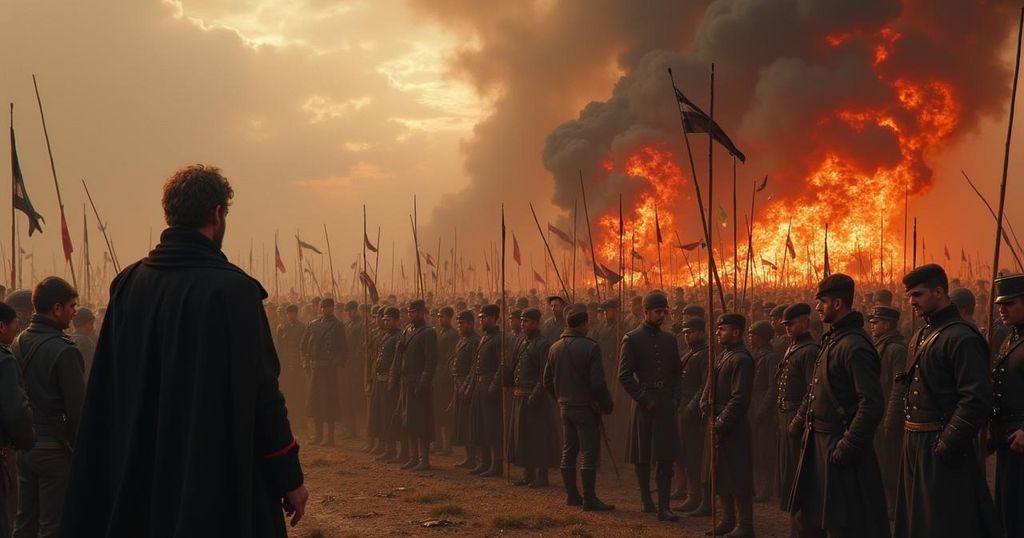Implications of Wagner’s Insurrection: A Turning Point for Putin and Ukraine

The insurrection by Yevgeny Prigozhin has revealed critical vulnerabilities in Vladimir Putin’s authority, marking a significant shift in Russian politics. While Prigozhin’s attempt to seize power raised hopes for internal discord impacting the war in Ukraine, the immediate consequences remain complex and uncertain. Ultimately, the event has underscored the fragility of Putin’s regime and its implications for Ukraine’s ongoing conflict.
The recent insurrection led by Yevgeny Prigozhin, the leader of the Wagner Group mercenary organization, has unveiled profound shifts in the political landscape of Russia and casts a long shadow over President Vladimir Putin’s authority. For several hours, the events of the weekend illustrated that Putin’s grip on power is not as unassailable as he had portrayed. This situation can be summarized through three critical observations that encapsulate the implications for both Russia’s domestic stability and its ongoing conflict with Ukraine. Firstly, the agency of Prigozhin must be acknowledged. He has long been viewed as a loyal servant of Putin, yet his actions during the insurrection depicted a man who sought to usurp his former patron’s authority. Prigozhin achieved considerable military success in Ukraine, particularly in the battle for Bakhmut, yet this victory came at a significant human cost, which fueled his confidence as he stepped into a power struggle with the military leadership in Moscow. The lesson here is stark: one does not challenge the Tsar without thorough preparation and a considerable chance of victory. Secondly, this turmoil has underscored the vulnerabilities in Putin’s rule. After over two decades of cultivating an image as an unassailable strongman, the unanticipated uprising has exposed the fractures within his regime. Although Putin managed to retain his position—suffering a Pyrrhic victory—it revealed a leader cornered by his former allies. Prigozhin’s revolt indicated that Putin’s authoritarian control is faltering and his governance system, reliant on a complex web of patronage and intimidation, may be reaching its limits. The significance of this realization cannot be overstated, as Putin may face growing challenges from within his own ranks, complicating his position further. The third and final lesson pertains to the ongoing conflict in Ukraine. Despite hopes from the Ukrainian side that an internal conflict within Russia might shift focus away from the war, the direct implications of the insurrection for military operations remain unclear. Questions linger regarding the fate of key military leaders such as Defense Minister Sergei Shoigu and Chief of General Staff Valery Gerasimov, whose silence amid the chaos raises concerns about command stability. Moreover, the revelations stemming from Prigozhin’s accusations—asserting that greed among military leaders, rather than external threats, prompted the invasion—highlight the internal rifts that may continue to undermine the Russian war effort. In summary, the upheaval initiated by Prigozhin reveals critical vulnerabilities within Putin’s regime and poses complex questions about the future of both Russian governance and the trajectory of the war in Ukraine. As this unprecedented crisis continues to unfold, its ramifications will likely resonate for an extended period, shaping both domestic and international responses.
This article centers around the recent insurrection involving Yevgeny Prigozhin, the chief of the Wagner Group, which represents a shifting power dynamic within Russia. It discusses how this event has not only impacted President Vladimir Putin’s grip on power but has also influenced the ongoing conflict in Ukraine. The insurrection challenges the long-standing narrative of Putin as a strongman leader and disrupts the internal structures of power that have been in place since his rise.
The insurrection led by Prigozhin has exposed significant vulnerabilities within President Putin’s authority and the established political framework of Russia. Furthermore, this crisis complicates the operational landscape in Ukraine, reinforcing the perception that the invasion is fraught with miscalculations and internal dissent. As the situation develops, the consequences are likely to have long-lasting effects on the geopolitical tensions in the region and Putin’s governance.
Original Source: worldcrunch.com








